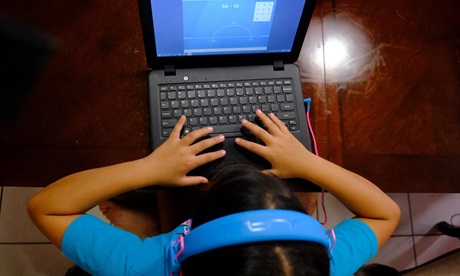Two key educators associated with Head Start of Miami-Dade County in Southern Florida and Catholic Charities of the Archdiocese of Miami worry about an uptick in youngsters with specific developmental disabilities and special needs.
While the exact causes remain a matter of speculation, it is thought that excessive electronic device screen time among the very young and possibly the lingering impact of the coronavirus-related lockdowns of 2020 and reduced in-person socialisation are likely key factors driving the trend.
Developmental delays
Maria Riestra-Quintero, president of the Florida Head Start Association, who spoke at an Aug. 9 conference in Miami, talked to the Florida Catholic, Miami’s archdiocesan news outlet, about her concerns.
“We have seen an increase recently in children with all sorts of developmental delays — mainly in speech and language, and we think it has to do with use of tablets in the early years,” she said.
She added that 90 percent of the brain “develops in the first five years of life and with a (electronic device) tablet a child doesn’t have a feedback loop.”
“If we are having a conversation I am asking you questions, you are responding to me then that is what we call a feedback loop and that develops receptive and expressive language,” said Riestra-Quintero.
She is the assistant director of early childhood programs in the Head Start/Early Head Start Division of Miami-Dade County’s Community Action and Human Services Department.
She refers to the screen time usage guidelines set forth by the American Academy of Child & Adolescent Psychiatry, which has detailed recommendations on managing a child’s screen time according to age.
Screen time includes interaction with smartphones, tablets, gaming consoles, TVs and computers.
How much screen time?
The Academy recommends:
Until 18 months of age limit screen use to video chatting along with an adult (for example, with a parent who is out of town).
Between 18 and 24 months screen time should be limited to watching educational programming with a caregiver.
For children 2-5, limit noneducational screen time to about one hour per weekday and three hours on the weekend days.
On average, children ages 8-12 in the United States spend four to six hours a day watching or using screens, and teens spend up to 9 hours.
Too much screen time can be harmful
While screens can entertain, teach and keep children occupied, too much use may lead to problems, according to the academy.
The results of overuse can include sleep problems, poor academic performance, poor reading habits, less social time, reduced outdoor and physical activity, obesity, mood problems, and poor self-esteem and body image issues.
“If you use a tablet there is receptive language but not expressive language, so you cannot express yourself,” Riestra-Quintero said.
“You are listening, you are taking in, but when it’s time to express your feelings, your emotions and to be able to communicate we are seeing that many students are coming in with a greater gap since COVID,” she said. Read more
- Tom Tracy writes for OSV News from Florida.
News category: Analysis and Comment.




